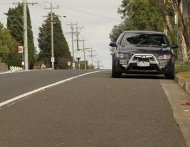Article from: www.thenewspaper.com/news/31/3155.asp
5/29/2010
Australia, UK: Legal Challenges To Speed Cameras
Motorists challenge the accuracy and legality of speed cameras in the UK and Australia.
 The private company Serco, which operates speed cameras in Victoria, Australia, has been caught ignoring state regulations in order to boost revenue. According to the Victorian Mobile Speed Camera Policy, photo radar units should not be used at the bottom of a steep hill. The Car Advice documented the mobile camera cars in the forbidden locations. Three years ago, Car Advice also uncovered speed traps hidden behind bushes, contrary to police policy.
The private company Serco, which operates speed cameras in Victoria, Australia, has been caught ignoring state regulations in order to boost revenue. According to the Victorian Mobile Speed Camera Policy, photo radar units should not be used at the bottom of a steep hill. The Car Advice documented the mobile camera cars in the forbidden locations. Three years ago, Car Advice also uncovered speed traps hidden behind bushes, contrary to police policy.
The pressure to generate citations comes from the top. Assistant Police Commissioner Luke Cornelius admitted in a sworn 2007 affidavit reviewed by the Herald Sun newspaper that the state's top leaders pressured him to collect revenue from speed cameras that he knew were faulty and that he knew had issued tickets to innocent motorists.
"I had discussions with the solicitor general in relation to the legal position, on how I should exercise my prosecutorial discretion in relation to traffic cameras, which was one of the matters that was raised as a result of concerns about camera accuracy," Cornelius said in 2007, according to the Herald Sun. "The minister's office was not happy with my advice and they put pressure on me to adopt a different view. I did have some telephone contact with minister Haermeyer's chief of staff during the traffic camera issues, because obviously he was seeking a particular outcome and I was holding the line."
Cornelius prevailed and the bogus tickets were refunded in full. Victoria plans to raise A$437 million from speed cameras this year.
In Cambridge, England, electrical engineer Andrew Fowler, 48, is challenging the accuracy of a speed camera ticket he received. Prosecutors claim his Skoda Favorit was traveling at 41 MPH in a 30 zone on a cold morning, but Fowler examined the components of a Gatsometer-brand speed camera and found a vital timing circuit was only accurate when used in a temperature range of 32 and 158 degrees Fahrenheit. It was a cold, 23-degree morning on February 2 when he was accused of speeding. He has an appeal before the Cambridge Crown Court scheduled for July, the London Telegraph reported.
 The private company Serco, which operates speed cameras in Victoria, Australia, has been caught ignoring state regulations in order to boost revenue. According to the Victorian Mobile Speed Camera Policy, photo radar units should not be used at the bottom of a steep hill. The Car Advice documented the mobile camera cars in the forbidden locations. Three years ago, Car Advice also uncovered speed traps hidden behind bushes, contrary to police policy.
The private company Serco, which operates speed cameras in Victoria, Australia, has been caught ignoring state regulations in order to boost revenue. According to the Victorian Mobile Speed Camera Policy, photo radar units should not be used at the bottom of a steep hill. The Car Advice documented the mobile camera cars in the forbidden locations. Three years ago, Car Advice also uncovered speed traps hidden behind bushes, contrary to police policy.